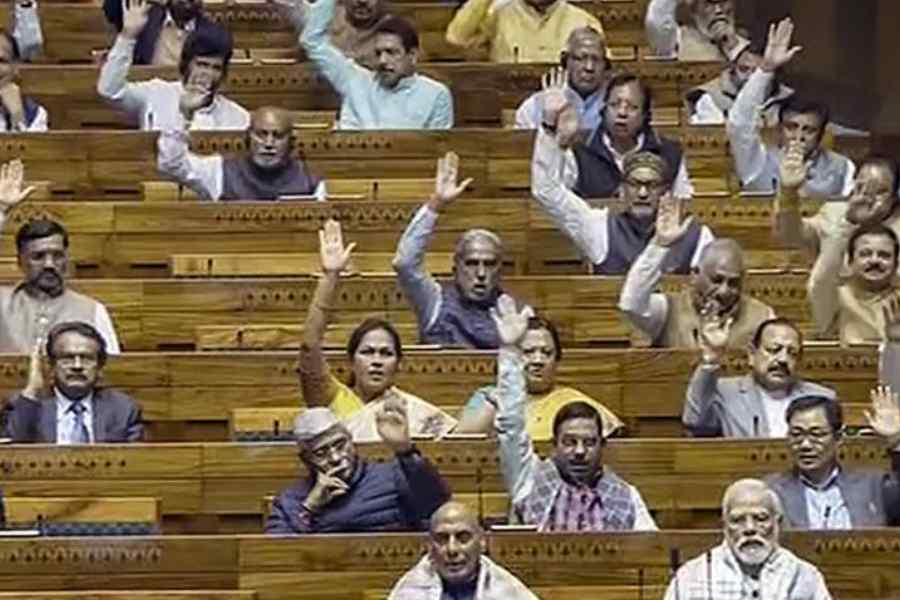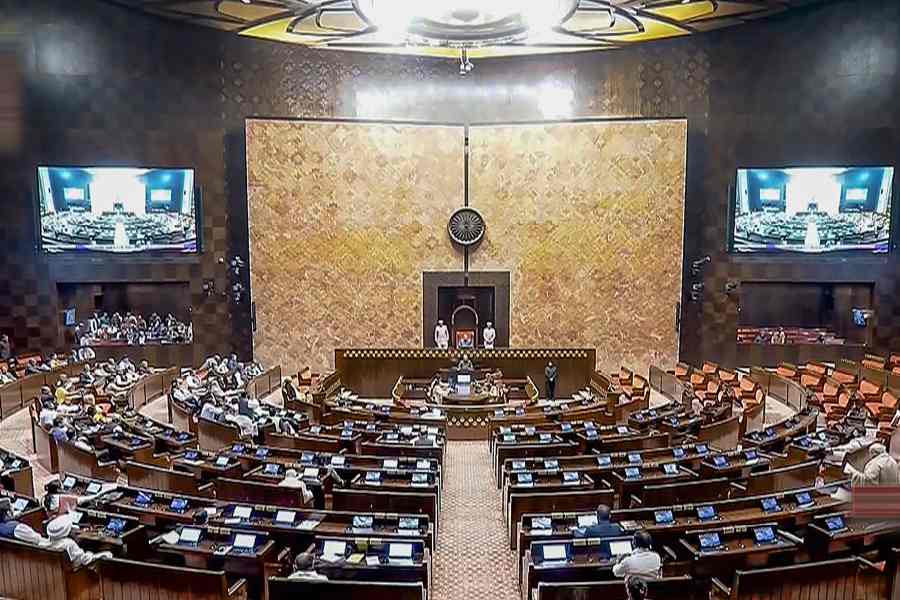A Lok Sabha depleted of Opposition ranks on Thursday passed a bill contrary to a constitution bench ruling of March 2 that said the panel that picks election commissioners and their chief “shall” include the Chief Justice of India.
The Chief Election Commissioner and other Election Commissioners (Appointment, Conditions of Service and Term of Office) Bill, replaces the CJI with “a Union Cabinet Minister to be nominated by the Prime Minister”.
The other two members of the selection committee will be the same as suggested by the five-judge Supreme Court bench in March — the Prime Minister and the leader of the Opposition (or leader of the single largest Opposition party).
This means the government will have a 2:1 majority on the panel, thus enjoying final say in the appointments of the CEC and other ECs. Many saw in this a blow to
the independence of the poll panel that the apex court had wanted to protect by inducting the CJI into the selection process.
The apex court judgment had come on a batch of petitions that challenged the existing practice of the government unilaterally appointing the CEC and the ECs. Since the judgment, no EC or CEC has been appointed and no selection panel needed to be formed in keeping with the court directions.
The bill was passed by voice vote against the backdrop of an unprecedented mass suspension of Opposition members. Opposition members who have not been suspended continued sloganeering throughout the discussion on the bill.
The Rajya Sabha has already passed the bill.
After laying down the composition of the selection panel, the March 2 judgment had said: “This norm will continue to hold good till a law is made by Parliament.”
Contacted by The Telegraph, advocate Prashant Bhushan, who had represented the Association for Democratic Reforms (ADR) — one of the petitioners before the apex court in the matter — said the organisation would challenge the new law once it was notified in the official gazette.
“The constitution bench judgment is based upon the finding that the appointment of the election commissioners being in the control of the government alone poses a threat to free and fair elections and, therefore, democracy,” Bhushan said.
“Therefore, any act which again brings the appointment of ECs under government control violates free and fair elections and therefore democracy and therefore violates the Constitution. We will challenge it in court.”
Advocate Kaleeswaram Raj, who had moved an intervention application before the constitution bench, said: “The Centre’s move to nullify the radical judgment of the Supreme Court… is deplorable. It’s also vulnerable to legal challenge before the Supreme Court.”
He added: “It is incorrect to think that the Supreme Court only prescribed an ad-hoc arrangement for selecting the Election Commission till a new law was made.”
Raj added: “The court also indicated how such a selection should be made so as to ensure the installation of an independent Election Commission in India. This is a precondition for free and fair elections, which is a basic feature of the Constitution. The Centre’s move to overturn the spirit of the judgment is clearly unconstitutional and undemocratic.”
The bench of Justices K.M. Joseph, Ajay Rastogi, Aniruddha Bose, Hrishikesh Roy and C.T. Ravikumar had also made a “fervent appeal” to Parliament to create a permanent secretariat for the Election Commission and allow the poll panel to charge its expenditure to the Consolidated Fund of India to ensure it “becomes truly independent”.
The bill says nothing on this.
Justice Rastogi (now retired) had in a separate but concurring judgment said the removal of the ECs should be only through impeachment in Parliament on a par with Supreme Court and high court judges. Presently, only the CEC needs to be removed through impeachment, while the other ECs can be removed on the recommendations of the CEC.
However, the other four judges had left the task of granting immunity to the ECs to the wisdom of Parliament as it was a policy decision. The bill says the old arrangement would continue.
The apex court had passed the directions on a batch of four PILs — moved an individual, Anoop Baranwal; the ADR; advocate Ashwini Kumar Upadhyay and Madhya Pradesh Congress leader Jaya Thakur — besides the intervention application from Raj.
House debate
In the House, BJD member Bhartruhari Mahtab supported the bill, underlining how the apex court had in 2015 struck down the National Judicial Appointments Commission — which would have given the government a greater say in the appointment of judges — citing the importance of the separation of powers between the judiciary and the executive.
“The CJI being in the committee… raises the question of the violation of the doctrine of separation of powers as the appointment falls in the domain of the executive…. In case there is a case of impropriety that comes up against the EC members in court, it would cause embarrassment to the CJI,” he argued.
The BJP’s Sanjay Jaiswal referred to the mimicry, allegedly of Vice-President Jagdeep Dhankhar, by suspended Trinamul member Kalyan Banerjee.
He said Prime Minister Narendra Modi was large-hearted enough to include the leader of the largest party in the Lok Sabha in the selection panel even though none qualified for the leader of the Opposition’s post, and despite the Opposition allegedly not respecting the Prime Minister, President or Vice-President.
“To break his (former CEC T.N. Seshan’s) powers, two more ECs were appointed…. As soon as he (former CEC M.S. Gill) retired he was made a Rajya Sabha MP (three years after his term as CEC ended) and a minister,” Jaiswal said.
“They (Congress) never made a (selection committee) because they wanted to run the EC according to their own whims.”
AIMIM member Asaduddin Owaisi opposed the bill.
He decried the clause that limits the selection to people who have experience in conducting polls and have served in the rank of Union secretary — a clause that former CECs from the Indian Revenue Service have disapproved of.
Owaisi said: “The government is basically saying (that) so long as you are faithful to us we will ensure that you get a rightful post…. So, proximity and faithfulness and capitulation are very important for anyone to get all these posts.”
The chair — the BJP’s Rajendra Agrawal — expunged Owaisi’s remark comparing B.R. Ambedkar to Mahatma Gandhi.
Both the YSR Congress and the Telugu Desam Party supported the bill, although the Desam accused the YSR Congress of misusing state machinery to delete the names of political opponents from the electoral list in Andhra Pradesh.
Desam member Jayadev Galla suggested that apex court judges, too, be considered for appointment as ECs.
Law minister Arjun Ram Meghwal said in conclusion: “The Congress left incomplete in the 1991 act what Babasaheb (Ambedkar) had asked for (that Parliament decide on the appointment procedure for the Election Commission). Now it is Modiji’s term. This is the time, the right time, India’s invaluable time.”
The bill says: “A Search Committee headed by the Cabinet Secretary and comprising of two other members not below the rank of secretary to the Government of India, having knowledge and experience in matters relating to elections, shall prepare a panel of five persons for consideration of the Selection Committee, for appointment as the Chief Election Commissioner and other Election Commissioners.
“(1) The Chief Election Commissioner and other Election Commissioners shall be appointed by the President on the recommendation of a Selection Committee consisting of — (a) the Prime Minister — Chairperson; (b) the Leader of Opposition in the House of the People — Member; (c) a Union Cabinet Minister to be nominated by the Prime Minister — Member.
“Explanation. — For the purposes of removal of doubts, it is hereby declared that where the Leader of Opposition in the House of the People has not been recognised as such, the leader of the single largest party in opposition of the Government in the House of the People shall be deemed to be the Leader of Opposition. (2) The appointment of Chief Election Commissioner and other Election Commissioners shall not be invalid merely by reason of any vacancy in or any defect in the constitution of, the Selection Committee.”












